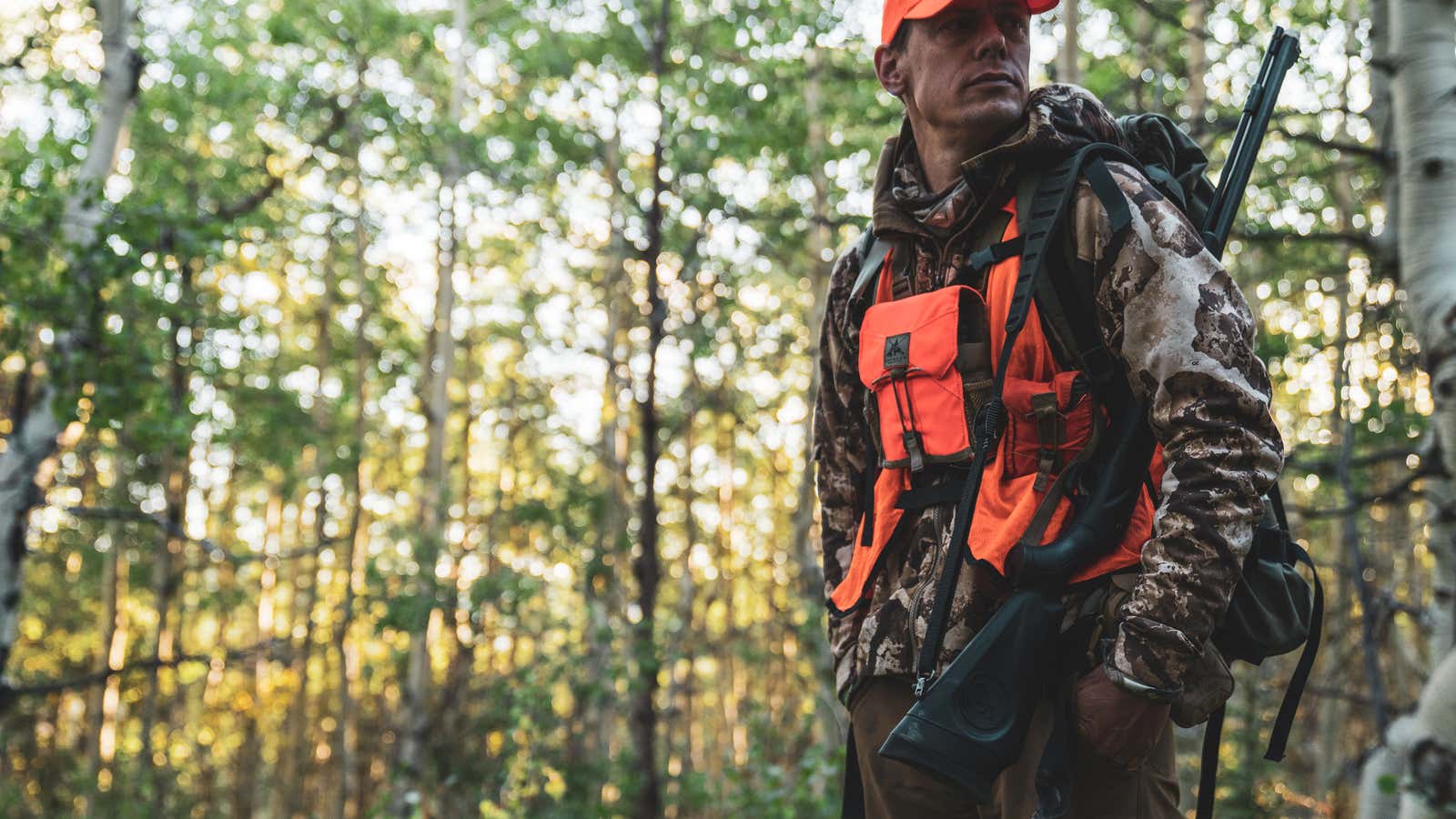About a week before I flew to Michigan to hunt with Steven Rinella, my family and I checked out MeatEater, his reality show on Netflix. After a few hours of watching Rinella track, shoot, and consume a menagerie of wildlife ranging from elk to squirrels, my wife told me, “If you can’t shoot a deer with this guy, you’re never going to.”
She had a point. Rinella is a modern-day Daniel Boone, who began as an outdoors writer and has since built a small media empire around his enthusiasm for wild places and his (literal) appetite for wild game. I, on the other hand, was a hunting novice, with almost no experience and zero slain animals in the three seasons I had tried. I had written about my first, hapless foray into the woods for Quartz, and the article attracted the attention of Rinella’s publicists. Eventually, an invitation was extended: Would I like to hunt with Steve?
The idea seemed a bit absurd, like a novice golfer being offered 18 holes with Tiger Woods (it would still be a few months before the onset of Covid-19 made crowding two men into deer blinds impossible). But 10 months later, I was bouncing along in an open-sided four wheeler in the black of an early December morning with Rinella at the wheel. I still was skeptical I would be shooting a deer, but I knew my odds had gotten a lot better.
***
Rinella and I were following Guy Zuck, a hunting guide and the manager of the Western Michigan farm where we were hunting. After a short drive, we turned onto a farm track and parked. As we exited the four-wheeler, Rinella said nothing. I understood we were done talking and I was to stay silent. We unzipped the gun cases, shouldered our weapons, and followed Zuck into the dark woods.
Zuck and Rinella didn’t use flashlights, and I marveled at how they walked silently between the trees, with only starlight to guide them. We first traveled along a cleared path, then turned into the woods, and I struggled to keep up, scrambling through the underbrush trying not to make a sound.
Eventually we stopped, and Zuck muttered some instructions to Rinella. “Good luck,” he whispered to me before disappearing back into the dark.
Looming before us was a deer blind, an elevated black box reached by five or six stairs. Rinella opened the door, and I followed him, trying to stay quiet. Inside were two folding chairs, and room for not much more. We slid open the narrow, horizontal windows that served as our vantage onto the still-dark woods, and I tried to situate myself in the chair to Rinella’s right.
As I fumbled around with my rifle, backpack, hat, gloves, binoculars, and chair, I knocked over my insulated coffee mug. The clatter seemed deafening in the silence. “Get that under control,” Rinella whispered sternly.
Rinella hunts from blinds only occasionally. He prefers the spot-and-stalk method, and the most riveting episodes of MeatEater feature him or a companion circling around an elk with a bow or rifle in hand, mindful of the wind direction, as they slowly creep within shooting range. But we were in Michigan hunting whitetail, and that meant waiting in a blind and hoping the deer cooperated.
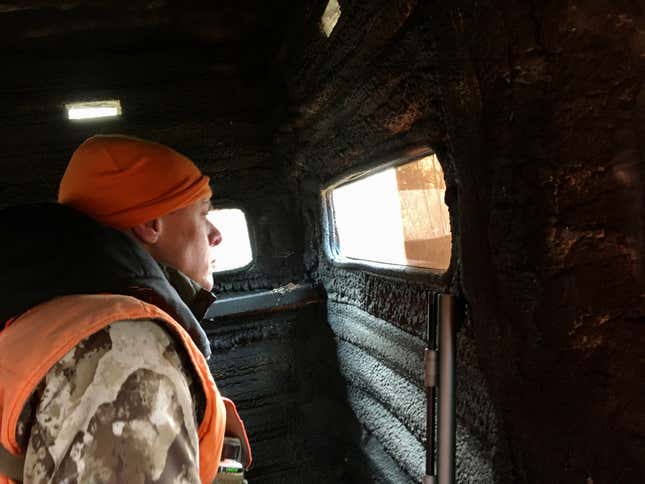
We sat in the dark for 45 minutes, saying almost nothing. Very gradually, it began to grow light, and I began to look around. At first, I just gazed out into the still-murky woods through the windows in front of me and to my right. But as the minutes crept along and my mind wandered, I tried to be more diligent. I began counting every tree in front of me, from left to right, and reached the 90s. Over and over again, I looked for deer, occasionally through binoculars, but the only sign of movement was the occasional falling leaf.
Then, as I peered over Rinella’s shoulder, I saw a gray shape moving in the far distance. I hesitated, conscious that I had been fooled before into thinking a collection of branches was a deer. But no, it was clearly a deer, a doe, that quickly disappeared back into the underbrush. As I whispered my discovery, I was inordinately proud that I beat Rinella in spotting the first deer.
A few more does followed, then vanished. Over the next hour more deer appeared, some moving fast, others slow, always traveling along the same axis, about 150 yards to our left, frustratingly out of range.
***
Rinella began hunting in rural Michigan as a child, earned spending money as a teen trapping muskrats and foxes for their pelts, and has spent most of the last two decades traveling from Alaska to Patagonia in the pursuit of fish and game. When his wife, Katie, pointed out to him that he spent half the year away from home, he started counting his days on the road, eager to prove her wrong. He stopped when he reached 180.
Rinella, 46, lived in Brooklyn for eight years when he was starting out as a writer, and he probably could walk through Park Slope today unrecognized. But in the world of hunting and fishing, he is a celebrity. His deadpan, self-deprecating humor and environmental advocacy wins fans bored with conventional hunting shows.
MeatEater, Rinella’s reality show, was originally broadcast on The Sportsman Channel. Netflix picked up the show in 2015, and its ninth season debuted in September. His six books, which include a pair of cookbooks, have sold more than 700,000 copies; the seventh, a wilderness survival guide, is due in December. His podcast ranks among the top 10 among all sports pods, and a live tour—which promises little more than Rinella and his buddies sitting around a stage talking about hunting and fishing—was booked for 35 dates before Covid-19 threw a wrench in the plans.
In 2018, the success of MeatEater and its assorted products attracted the Chernin Group, a media-focused investment firm with stakes in everything from meditation app Headspace to loutish sports site Barstool Sports. Chernin has poured more than $50 million into Rinella’s company, according to Axios, and Rinella is now chief creative officer of MeatEater Inc., a growing concern of more than 50 employees that also sells barbecue seasoning and hunting apparel while producing six podcasts and the Netflix show.
***
I wanted to hunt with Rinella not just to learn from the best, but because I wanted to explore what felt like a cultural shift in how Americans view hunting, a change that Rinella is helping lead.
Hunting is a niche activity, albeit one with millions of Americans in the niche. While most are rural dwellers who learned hunting from their parents and grandparents, there’s a growing number of aspiring hunters who grew up removed from its traditions. In some circles, hunting has undergone a reappraisal, and there’s increased interest from coastal liberals in a sport once stereotyped as the pastime of rednecks. While converting curious Brooklyn hipsters into active hunters is a slow process, hunting advocates are hopeful.
A number of factors are at work. Concerns about industrial-scale farming, and its impact on health and the environment, have fueled the locavore and farm-to-table movement. The rise of meat-oriented diets, like paleo and keto, has ignited interest in foods found hunting and gathering. And there’s growing realization that hunters, once viewed as the enemy of environmentalists, are actually allies in the fight to preserve wilderness and fight climate change.
MeatEater, it seems, hit the zeitgeist at exactly the right time. It’s a hunting show with plenty of appeal for non-hunters, with a reverence for nature and as much emphasis on the cooking and eating of wild game as on the hunting of it. Created by Zero Point Zero, the production company that helped make a star of Anthony Bourdain, MeatEater avoids getting sucked into the controversies that surround hunting and guns, and is instead a safe space for viewers of all political stripes. Like Bourdain’s shows, MeatEater is propelled by a strong personality with an insatiable curiosity, and is flavored by Rinella’s wry, smart narration.
***
Rinella and I initially connected by phone, not long after the article about my first hunt appeared. It turned out we had much to discuss, including our fondness for Bozeman, Montana, a town where I lived for three happy years in my 20s, and where Rinella lives now. He was funny and engaging, and seemed genuinely interested in my project.
We didn’t meet in person until the evening before our hunt. He had flown from Montana, and arrived carrying an insulated Yeti bag containing the elk sausage and duck breasts we would be eating for the next two days. Lean and rangy, with a boyish face and close-cropped hair, Rinella moves with an easy confidence. In conversation he peppered his language with f-bombs and has a relaxed manner that quickly shifted to intensity when the topic interested him. He struck me as someone who made friends easily. Months later, when I watched an episode of MeatEater with my mother, she noted how “chic” he looked. When I pointed out he was wearing a baseball cap and T-shirt, she shrugged. “He’s very good-looking,” she said.
Rinella never played high school sports. Instead, he and his older brothers seemed to spend every non-school hour hunting, fishing, or trapping in the woods and rivers of Twin Lake, Michigan.
The Rinella boys were guided in their outdoor endeavors by their father, a World War II veteran and insurance salesman who had a second family later in life. Frank Rinella was stationed in Paris after the war, and, according to Rinella’s first book, The Scavenger’s Guide to Haute Cuisine, thrived as a black market dealer of US Army-issued motorcycles and cigarettes. He spent his profits exploring the city’s culinary delights. His plan to return to France after attending college in the US was cut short when he had his first family, and he never made it back. But that wanderlust and taste for fine dining seems to have passed on to his youngest son.
A good student but without clear plans, Rinella knew he wanted to make a living hunting and fishing. His older brothers both pursued wildlife biology, eventually earning PhDs and jobs with the government in ecology, and he considered earning a living as a trapper and flirted with joining the Army.
A high school English teacher saw promise in Rinella’s writing, and he pursued it at a community college, then at Grand Valley State University, near Grand Rapids. There, he took a class in political rhetoric. “We read everything—from the Unabomber to Camille Paglia to Martin Luther King Jr.—and I really fell in love with the power of writing,” he said.
Rinella enrolled in graduate school for writing at the University of Montana, which he chose over Colorado State because of its superior hunting opportunities, and began polishing his craft as an essayist and nonfiction writer. While his classmates were reading George Saunders and attempting to write avant-garde fiction, Rinella was trying to be the next Truman Capote or John McPhee. “I wanted to be doing shit that I was interested in and then writing first person accounts of interesting people,” he said.
Rinella quickly found success placing articles in Field & Stream and Outside magazines, which led to The Scavenger’s Guide in 2006. A mix of travelogue and memoir, the book describes a year-long quest to assemble the ingredients for a 45-course meal based on the recipes in Le Guide Culinaire, a 1903 cookbook by French chef Auguste Escoffier that Rinella says he studied with “Talmudic thoroughness.”
The story, which was motivated in part by his father’s death in 2002, takes Rinella from catching eel in weirs in the Catskills to halibut fishing in Alaska. His long-suffering, vegetarian girlfriend, Diana, is along for the ride, and the story is a freewheeling picaresque rich with character and joyful writing. At one point, Rinella is driving through the roasting northern California summer to hunt for wild pigs. “The heat was unbelievable. It was so hot I actually laughed. I laughed like you would if someone knocked on your door and asked for a thousand dollars. It was an incredulous, insulted laugh.”
After reading his book, I was left with the depressing thought that not only was Rinella a much better hunter than me, he might be a better writer, as well.
***
On the first afternoon of my trip—and about 16 hours before Rinella and I would crowd into the deer blind—I arrived in Kalamazoo, Michigan, with a duffel bag full of warm clothes, and was met at the airport by Zuck. The farm Zuck managed was maintained as a hunting preserve for its owner, Matt Cook, a Chicago-based business executive. Its lodge was a vast building filled with mounted heads of deer, where Cook hosted groups of veterans on hunting excursions. A few smaller cabins dotted the property, and I was shown to one that could have slept 20 in its two rooms filled with bunk beds.
After we dropped off my bag, Zuck took me shooting. Given the lateness of the season, we would be hunting with muzzleloaders, and Zuck walked me through their peculiarities. While modern muzzleloaders can be as accurate as conventional deer rifles, they aren’t as powerful, so they have less stopping power. More significantly, they are loaded through the barrel like an old Revolutionary War musket, with the bullet tamped down with a ramrod. It’s a slow process, which means a hunter only gets one shot at the deer.
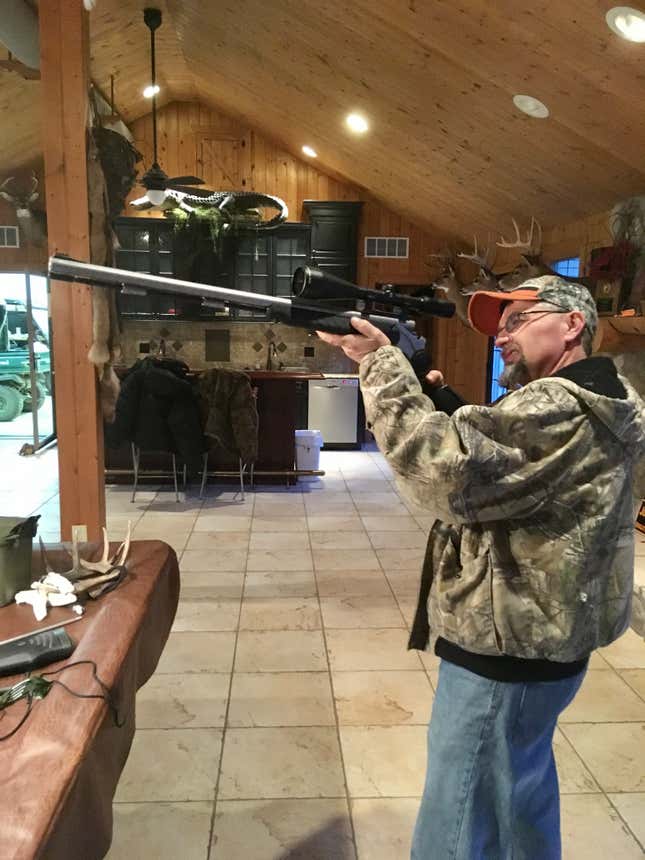
Later, Rinella would instruct me to only take a shot at a deer standing still, and broadside to me. If it was moving, Rinella would make a sharp noise to draw its attention and pause it. If the deer couldn’t smell us, I would have a moment or two to shoot. “Deer won’t trust their eyes, and they won’t trust their ears, but they’ll always trust their sense of smell,” Rinella said.
The goal was to shoot just past the deer’s shoulder, ideally in the first or second rib. A shot into the shoulder could shatter the bone, ruining the meat. A bullet in the ribs, however, would fill the lungs with blood, killing it quickly. If it was only wounded, we would wait 45 minutes for the deer to grow sluggish, then track its blood spoor. I desperately hoped it wouldn’t come to that. Zuck warned me to aim carefully through my scope and pick a tuft of hair on the deer’s side to shoot at. “Don’t shoot at the whole deer,” he cautioned cryptically, and I understood it to mean hunters can lose their focus with the excitement of seeing a deer. I would need to focus.
Complicating all of this was that my Michigan hunting permit only allowed me to shoot a buck, which meant we needed to see antlers to know it was male.
After making sure I could handle the muzzleloader safely, Zuck took me to a range where I fired off a few rounds. I surprised myself by hitting a target from 50 yards, and Zuck pronounced me ready to go.
***
After three hours in the blind, we still hadn’t seen a buck, and we agreed to call it quits until the evening. When we arrived back at the lodge, I was ready for breakfast and a nap. Rinella had other ideas: He was eager to go squirrel hunting, and had brought a .22 rifle with him just for that purpose.
After wolfing down some eggs, we headed out. Rinella explained the various squirrel species in Michigan (mainly gray, although there are also pine and fox), and squirrel behavior. They are preyed upon viciously by hawks, so any that survived this late into the year were pretty savvy about avoiding predators, he said. Late fall and winter, when the leaves have fallen, gave hunters the best chance of spotting them.
Attached to his belt Rinella kept a kind of lanyard with loops to hang squirrels. A successful hunt, it appeared, would garner half a dozen or so. Rinella likes to cook their legs with Buffalo sauce, like chicken wings, but he’ll also eat them wrapped in pastry dough with cheese.
The appeal of squirrel hunting for Rinella soon became apparent. They are generally abundant and they are hard to shoot. It was the opposite of deer hunting, where a long, tortuous wait can yield an easy shot. If deer hunting is reading a dense novel, squirrel hunting is playing a video game.
***
Before our next deer hunt that afternoon, Rinella explained his goal with MeatEater was never to convert new hunters, but simply to create a show that the dedicated hunters in his life—his brothers chief among them—could respect.
After his literary agent connected him with television producers, Rinella eventually partnered with Zero Point Zero. Their first forays—including an adventure show on the Travel Channel in 2002 called The Wild Within—were disappointing, Rinella said, because the shows tried to shoe-horn hunting and fishing into a narrative about something else.
Rinella wanted it to be the story. He didn’t want to justify why hunting and fishing was relevant to the show, anymore than he needed to explain why it was relevant to his life. “It had relevance, just in and of itself. It’s like how I fed myself, right?” he says. “It’s a way to have ecological awareness and participation and to understand landscape. It’s, like, fucking relevant.”
While the substance of MeatEater took shape early on, its look and feel evolved organically. Rinella says he never watched hunting shows growing up, and so had no preconceived notions about how to make one when he started.
To create an intimacy with the viewer, the camera is very close to Rinella, sometimes no more than 18 inches away. He often speaks in a whisper to avoid spooking game, but it has the effect of drawing the viewer closer. The show is shot with a wide lens, which helps create an expansive landscape. Music is used to create gravity, not excitement.
It also doesn’t flinch from failure, a big part of hunting. That was an early epiphany that helped set the show apart from the rest of the genre, said Morgan Fallon, a former executive producer and cinematographer on MeatEater who helped shape its sensibility. Early on, after spending 11 days looking for mountain lions in Arizona without success, they wondered if their failed hunt could be a show. They decided it could.
“Lots of hosts have a fear of failure on camera,” Fallon says. “Steve became very open to the idea of failing. He is so comfortable with who he is that he was cool with failure.”
There’s little talk about hunting equipment and weapons—manufacturers of which traditionally sponsor hunting shows—and much less focus on the kill shot, the moment when the animal tumbles to the ground. “A lot of people that I knew, hunters I knew, weren’t interested in a lot of hunting television because they thought it was like a snuff film,” Rinella says.
As for guns, they’re just another tool for hunting, Rinella says, like his waterproof boots.
That attitude has gotten him labeled in online forums as a “Fudd”—a gun owner who’s not sufficiently passionate about Second Amendment rights—and when the Chernin Group invested in MeatEater, the right-wing Federalist website pounced on Peter Chernin’s anti-gun activism as evidence the show was vulnerable to liberal influences. Rinella told the Federalist he’s never supported any sort of weapons ban, but it’s clearly a debate he’s not eager to take part in.
He has reason to be cautious, given the militancy with which the outdoors community polices any heterodox thoughts about gun rights. In 2007, Jim Zumbo, an editor of Outdoors Life and the host of a TV hunting show, saw his career crash down around him when he suggested guns like AR-15s had no role in hunting and were “terrorist rifles.” The reaction was swift and severe, and Zumbo lost both his show and editor’s position.
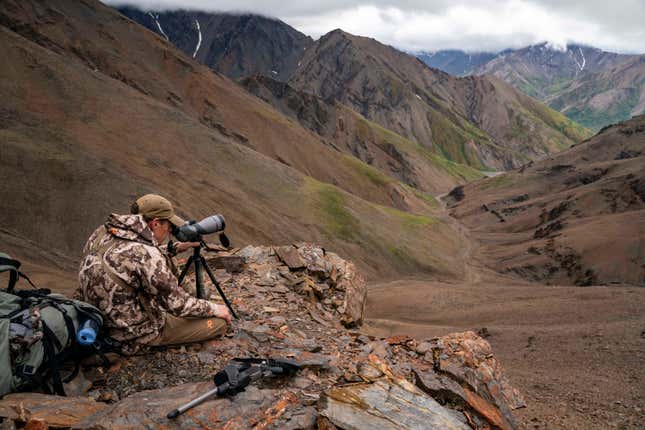
Rinella is more outspoken about his environmentalism, yet he avoids stridency on MeatEater. Climate change is a particularly nuanced topic, because while hunters and anglers are sensitive to its impact, they recoil at the term “global warming.”
“They get mad around certain language,” he says. “When people hear the term ‘global warming,’ what it triggers is ideas of hard government intervention.”
So Rinella relies on the old writer’s technique of “show, don’t tell.” On one episode of MeatEater that took Rinella out in a skiff crabbing in Maryland’s Chesapeake Bay, the action stopped as his local guide pointed out a string of nearly submerged trees. Those used to be islands, he said, but the rising sea level meant they had all but disappeared. No cause was mentioned, but the point was clear.
“I’m not apolitical, but I’m making a show that’s meant to be entertaining,” Rinalla told me. “And you’d have to be a fool to think I’m not aware of ways in which I might change people’s opinions about shit.”
***
Hunting in the afternoon has a very different feel to it. In the morning, there’s a sense of anticipation, like waiting for a curtain to rise. The world slowly fills with light, and you wait for the show to begin.
The afternoon is like writing a sports story on deadline, when you know all the most important action happens at the end, right before you have to file the article. Fish and game regulations mean hunters have a hard stop—depending on the state, sunset or 30 minutes after—and the clock is ticking. The deer, of course, tend not to move until it begins to grow dark, so the actual time available to hunt is compressed into a narrow window between when the deer appear and when the sun goes down.
So it was in the blind over the cornfield where Rinella and I headed around 2 pm, early enough to give the deer time to forget we were there. Again, the minutes passed with little to see or do. Rinella pointed out a harrier hawk, which led to whispered conversation about hawks. Then we waited some more.
Finally, just as it grew so dark I could barely see, Rinella spotted a pair of deer on his side, to the left of the blind. To me they looked like smudges, but he seemed to think they were a viable target. I switched from my binoculars to the rifle scope and tried to take aim, but I lost them in the switch. Maybe if I tried with my reading glasses on? I fumbled to get them on, but still wasn’t sure where I was looking. To steady the scope, I rested the barrel of the rifle on the blind’s window, but it sagged on the fabric, creating an awkward angle.
I could tell Rinella—who seems to enjoy superhuman eyesight—was growing frustrated with my ineptitude, but there was nothing I could do. I couldn’t shoot something I couldn’t see. A few more minutes passed and it was 5:30 and our time was up.
***
The next day began in a downpour. This would be my last opportunity to shoot a deer, and I was not optimistic. We might be foolish enough to be out in a chilly December rain, but I didn’t think the deer would be that dumb.
We returned to the same cornfield, but positioned ourselves in a blind on the opposite side. We were surrounded by fields—with potentially 360 degrees of shooting range should the deer cooperate.
Again we waited, and with the rain drumming on the roof, we whispered about hunting and mountain climbing. I explained to Rinella I had a lifetime goal of reaching the highest point of every US state (I’ve been up 37) and he quizzed me about the various peaks I’ve climbed. He seemed intrigued by the wild places the hobby took me, but said he didn’t have much patience for hiking without hunting. “If I’m going to climb a mountain, there better be something up there for me.”
Despite my misgivings, deer began to appear. One deer wandered past slowly and clearly in shooting range. Had it been a buck, it would have been the first clear shot of the weekend, but, alas, it was another doe.
As the morning wore on, and my chances diminished, Rinella called Zuck, and they agreed to take emergency measures to put a buck in front of me.
Rinella and I would park ourselves in a clear strip of land under a power line and Zuck would drive whatever deer were in the forest toward us. I recalled reading how English aristocrats used so-called beaters to drive game toward them, and this seemed similar.
The rain started again and Rinella and I crouched under a pylon, waiting for the deer to appear. The exercise felt desperate and a bit pathetic as we got progressively wetter. Eventually a few does appeared and I trained my scope on the section of forest from which they emerged. As I waited for a buck, my excitement began to mount. This might actually happen, I thought, as my finger nervously danced around the muzzleloader’s safety.
“Here comes something,” Rinella whispered. I tensed, ready to shoot. But it was just Zuck. He had pushed all the deer in front of him and that was it. Just like that, my hunting trip was over.
***
Hunting is not a sport that welcomes mass participation. Hunters want the public’s support and funding, but they don’t want the public out hunting with them. Nothing ruins hunting and fishing as much as crowds of people doing it. Rinella says his brother “wants to be the only person who hunts but has 100% public support.”
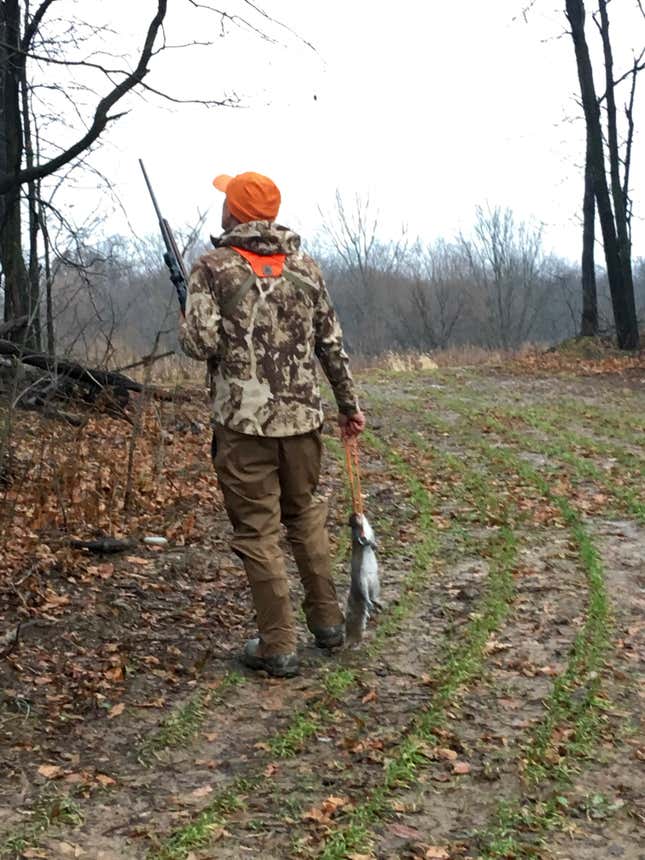
But hunting is facing a demographic challenge, as rural regions empty out and would-be hunters move to cities. Much of the conservation work done by state fish and game agencies is funded by the sale of hunting licenses and the excise taxes paid on guns and ammunition. If those revenue streams dry up, there will be fewer opportunities for hunters and anglers. Hunters also fear losing their political clout, as advocates in statehouses for wildlife and hunting access. The loss of the influence of hunters has already made itself felt in states like New Jersey, which faces a ban on bear hunting.
If Rinella is ambivalent about creating new hunters, his show and podcasts seem to be doing it with or without his participation. Given the size of the US population that hunts and fishes—almost 50 million (pdf), the vast majority of them anglers—MeatEater has just scratched the surface of its audience. But there is a far greater potential market in Americans who enjoy the outdoors, and wish they had more time to spend in it. That’s the real opportunity for MeatEater, and one that helped drive Chernin’s investment.
“We do hear all of the time from fans who were surprised to realize that they liked our show, and that were immediately drawn to the idea of going into the wild to source their food,” Rinella says in an email conversation later. “They typically express some version of this story: After growing up with the perspective that it’s wrong or immoral to have an active, hands-on engagement with the natural world, they suddenly realized from watching MeatEater that such a relationship with nature can be responsible, constructive, and personally rewarding. And that it’s possible to approach nature with a gun or rod while coming toward it from a position of love.”
After 12 hours waiting in blinds with one of America’s most accomplished hunters, I still hadn’t taken a shot at my prey, much less actually killed a deer. The aspects of hunting that MeatEater made so attractive—the gorgeous Western landscapes, the thrill of stalking game, the camaraderie of eating the day’s kill around the fire at night—were all missing from my experience. Thus far, I had found deer hunting cold, boring, and discouraging. Not for the first time had television sold an image more appealing than the reality.
Or perhaps I was just unlucky, a victim of warmer-than-normal weather that conspired to keep the deer bedded down. A week after my hunt, Cook, the owner of the farm, hosted another group of wounded veterans. He texted me a photo of five dead bucks in front of the vets. “They crushed it,” he wrote.
Rinella clearly wasn’t fazed by striking out with me. The occasional dud hunt is something he’s used to. And while I had to wait a year to dwell on my failure before getting back in the field, Rinella had no such issues. After a quick stop back home in Montana, he was off to Texas, where another hunt awaited.
